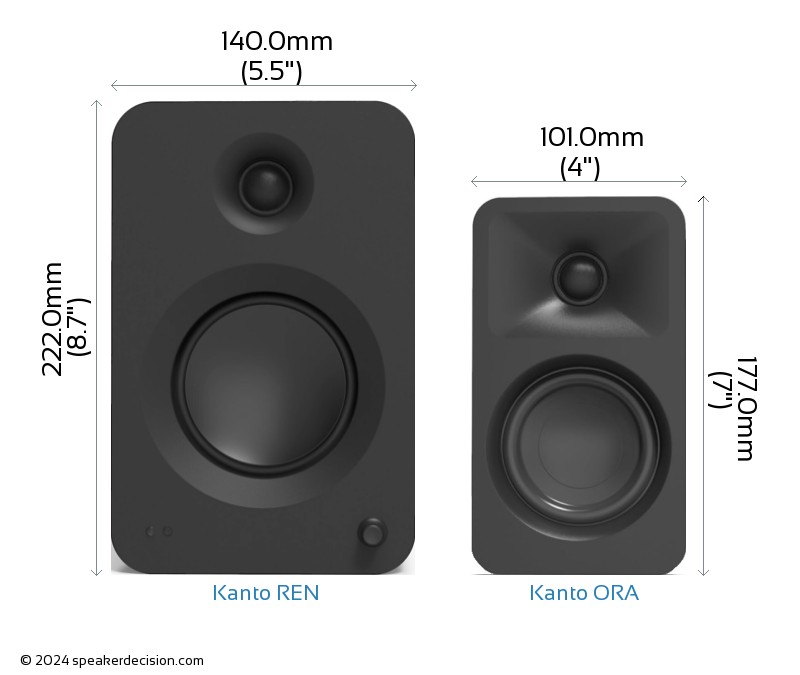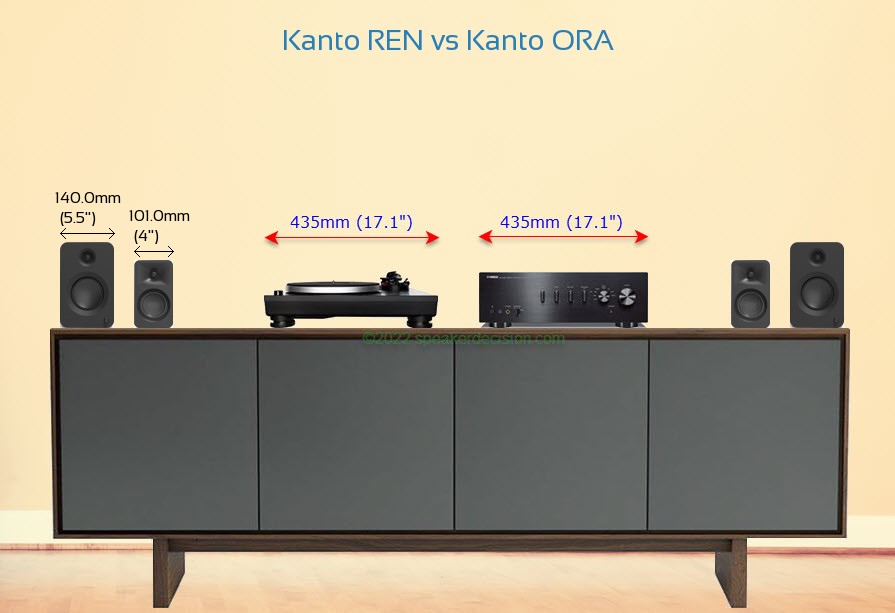In this review, we will be comparing Kanto REN and ORA, two Powered Bookshelf speakers by Kanto Being Powered speakers, they both have built-in amplifiers so you don't need an external power amp or an integrated amp to power them.
Let's have a brief look at the main features
of Kanto REN and Kanto ORA first before getting into our more
detailed comparison.
Kanto REN Key Specs
- 2-way Design
- 100-watt RMS( 200-watt Peak) Integrated Amplifier
- 1" soft-dome Tweeter
- 5.25" aluminum Woofer
- 50-22k Frequency Response
- 24-bit Max Depth / 96 kHz Max Sample Rate
- Built-in 5.3 Bluetooth
- App Control Feature
- Weight:3.90kg
- Dimensions (H x W x D): 222.0" x 5.5" x 7.5"( 222.25 x 139.7 x 190.5mm )
Kanto ORA Key Specs
- 2-way Design
- 50-watt RMS( 100-watt Peak) Integrated Amplifier
- 0.75" Soft-Dome Tweeter
- 3" Paper Woofer
- 70-22k Hz Frequency Response
- 24-bit Max Depth / 96 kHz Max Sample Rate
- Built-in 5.0 Bluetooth
- Dimensions (H x W x D): 177.0" x 3.9375" x 7.4375"( 177.0 x 101.0 x 189.0mm )
In the following sections, we will get into more detail in order to better understand how the Kanto REN and Kanto ORA compare and hopefully end up with enough arguments to decide which one of these loudspeakers is the better choice for you.
**This post contains affiliate links, and I will be compensated if you make a purchase after clicking
through my links. As an Amazon Associate I earn from qualifying purchases.
Drivers
Both Kanto REN and ORA are 2-way speakers.
| Driver |
Kanto REN |
Kanto ORA |
|
Driver Setup
|
2-way
|
2-way
|
|
Tweeter
|
1-inch
|
0.75-inch
|
|
Midrange
|
- |
- |
|
Woofer
|
1 x 5.25-inch
|
1 x 3-inch
|
Kanto REN features a 1" silk soft-dome Tweeter and 1 x 5.25" aluminum Woofer . On the other hand, the ORA features a 0.75" Silk Soft-Dome Tweeter and 1 x 3" Paper Woofer .
Frequency Response
Kanto REN has a frequency range of 50-22k whereas ORA has a frequency range of 70-22k Hz. With a minimum frequency of 50Hz, the Kanto REN can go significantly deeper on the low side and provide stronger bass compared to the ORA's min frequency of 70Hz.
Below graphs depict how these two speakers compare with the max, min and average values of the Min and Max Frequencies of other speakers in the Bookshelf class in our database.
Low Frequency
Bookshelf Speakers
High Frequency
Bookshelf Speakers
None of these speakers achieves full range experience which is commonly agreed as 20Hz-20kHz. In order to achieve lower lows / deeper bass, we recommend you pair these with a subwoofer. Visit our Powered Subwoofers section to find out more about the available options.
Cabinet Type and Port Position
Both Kanto REN and ORA have rear firing ports. Rear ported speakers generally need more room between the backside of the speaker and the wall compared to sealed and front/bottom ported speakers. Placing the speakers too close to the walls may cause the bass to sound boomy.
If you are limited in space and can't get the speakers away from the backwall, check our Speakers with Front Firing Ports page.
Physical Specs
Size of a speaker can sometimes become an important decision factor due to space constraints or in some cases purely for esthetic reasons. In this section, we are going to compare Kanto REN's and Kanto ORA's external dimensions. Kanto REN has external dimensions of 222.25 x 139.7 x 190.5mm ( 8.75inch x 5.5inch x 7.5inch ) whereas Kanto ORA has external dimensions of 177.0 x 101.0 x 189.0mm ( 6.94inch x 3.94inch x 7.5inch ) .
Kanto REN is clearly the larger of the two speakers. Its body is 39mm wider, 45mm taller and 1mm deeper than Kanto ORA.
Below you can see the front view size comparison of Kanto REN and Kanto ORA in scale.
 Comparison image of Kanto REN and Kanto ORA Size and External Dimensions
Comparison image of Kanto REN and Kanto ORA Size and External Dimensions
Base Surface Area Comparison
Base surface area of a loudspeaker may become a determining factor when the space in your room or desk is limited.
The base surface area of the Kanto REN is approximately 266.0cm2 / 41.2inch2 and base area of the Kanto ORA is approximately 190.9cm2 / 29.6inch2. The Kanto REN requires 39% more surface area than the ORA which gives it a small disadvantage on placement in tight spaces.
Here is an another comparison that shows both speakers on a BDI Octave Media Cabinet, next to a standard size amplifier and turntable in scale:
 Size Comparison image of Kanto REN and Kanto ORA on a Media Console
Size Comparison image of Kanto REN and Kanto ORA on a Media Console
What's in the Box of Kanto ORA?
Here are the items that come with the ORA:
Powered speakerPassive speakerAC power adapter (attached 58